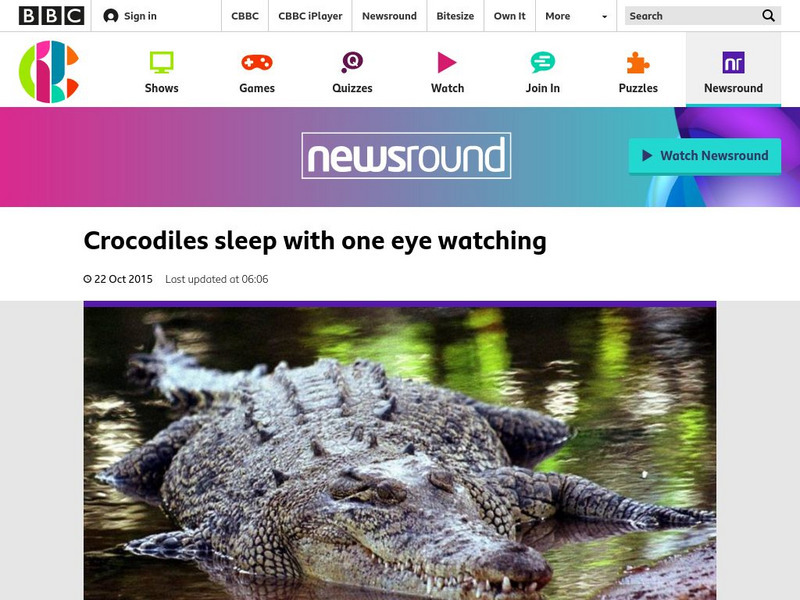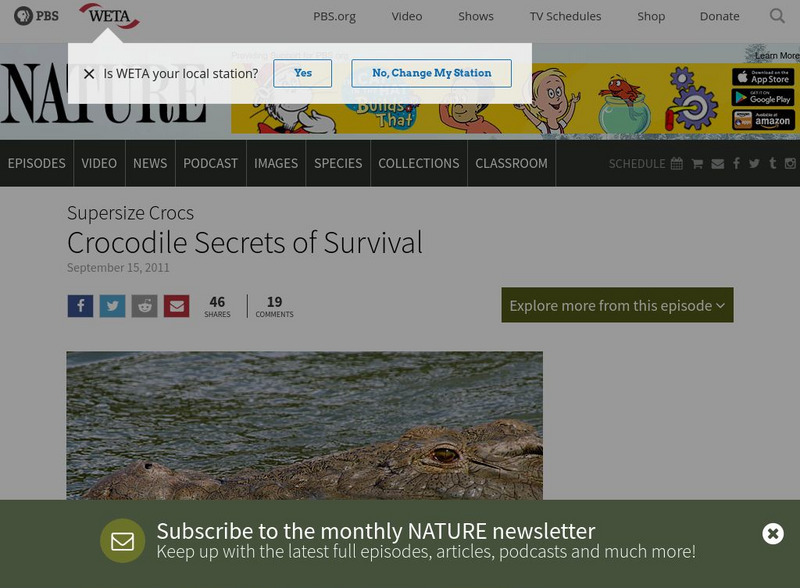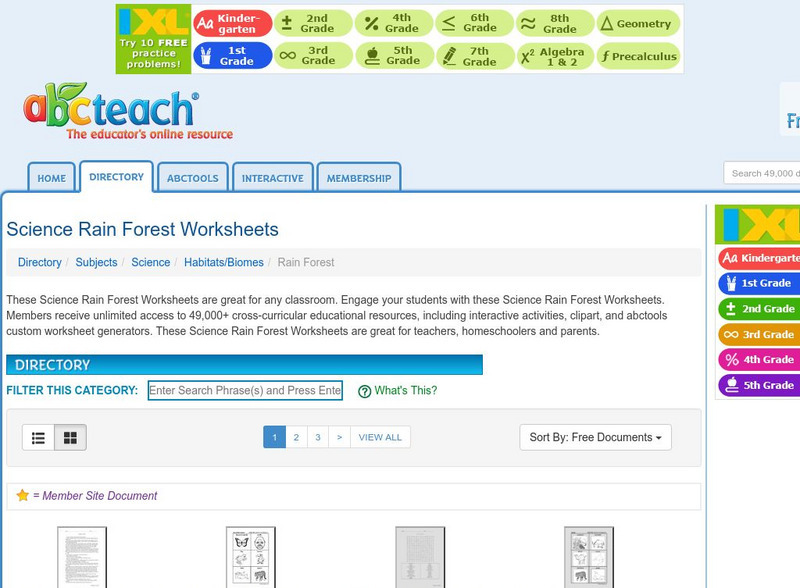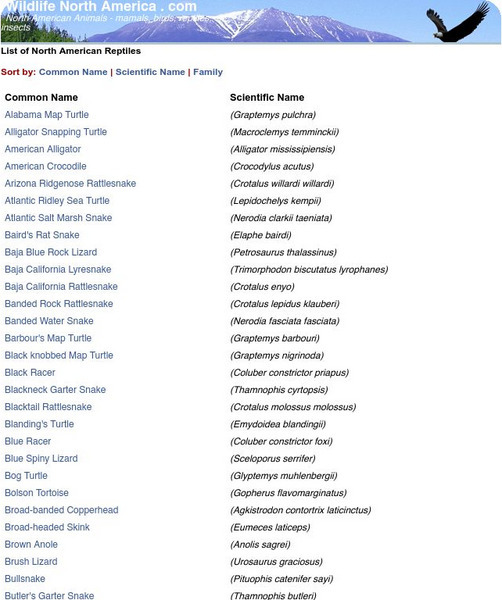BBC
Bbc Newsround: Crocodiles Sleep With One Eye Watching
Brief article reports on new research into how crocodiles sleep.
PBS
Pbs: Nature: Supersize Crocs: Crocodile Secrets of Survival
Documentary on the search for crocodiles measuring twenty feet or more in length, and the challenges to survival they face, e.g., from hunters. The reasons for their survival from dinosaur times are also examined.
Oakland Zoo
Oakland Zoo: American Alligator
Meet the American alligator and discover fascinating facts and statistics. Learn about its physical characteristics, habitat, diet, behavior, breeding patterns, and more.
Canadian Museum of Nature
Canadian Museum of Nature: Reptiles
Presents fascinating facts and colorful photos of a variety of reptiles plus a map of the location where they can be found.
Library of Congress
Loc: Poetry 180: To Help the Monkey Cross the River
This poem explains how the monkey crosses a river without getting hurt.
University of Florida
Flmnh: Crocodiles
The Florida Museum of Natural History provides photographs of alligators, caimans, crocodiles and charials can be used for reports and presentations as well as wildlife/reptile lesson plans.
Sheppard Software
Sheppard Software: Crocodiles
This site gives an in-depth description of a crocodile, including its behavior, appearance, and classification. The site includes photos and illustrations and an interactive quiz to test your understanding.
abcteach
Abcteach: Rain Forest
[Free Registration/Login Required] This site provides numerous links to facts, photos, information and activities all dealing with the rain forest. Teachers will find these links helpful in planning activities and lesson plans on the...
PBS
Pbs: The Clickable Croc
This informative site examines the role of the key parts of the crocodile. It specifically looks at the structure and function of the teeth, feet, tail, nostrils, skin, stomach, eyes, ears, and throat.
PBS
Pbs Nova Online: Wresting With Crocs
A fascinating interview with Dr. Alison Leslie who describes the danger and excitement associated which capturing a crocodile. Many interesting questions are answered like how do you weigh a half-ton croc and how do you stomach pump a croc.
Other
K 3 Learning Pages: Reptiles and Amphibians
Come and discover more about reptiles and amphibians when you explore this awesome resource. This site is filled with useful links.
Defenders of Wildlife
Defenders of Wildlife: American Crocodile
Comprehensive wildlife site provides extensive data on the American Crocodile. Discover more about its' diet, population, range, behavior and more. Be sure to click on the video icon for some rare footage.
How Stuff Works
How Stuff Works: Animals: Crocodiles
Crocodilians are a group of reptiles that include crocodiles and alligators. You can look at the anatomy of a crocodile then listen to some sounds while you learn to speak crocodilian.
Other
Britton: Crocodilians Natural History and Conservation.
This site from the Crocodilians Natural History contains information on Crocodiles. Site has information broken up into five sections.
BBC
Bbc Nature: Crocodile Family
Crocodiles and the dwarf crocodile is a family of reptiles within the Crocodile order. The Nile crocodile, American Crocodile, and mugger crocodile are example members of this family. Learn more about the crocodile family in this...
Other
Wildlife North America: North American Reptiles
View a comprehensive list of North American reptiles sorted by common name, scientific name, and family. By clicking on the common name, you can access photos and fun facts about each reptile.
A-Z Animals
A Z Animals: Animal Facts: Caiman (Caimaninae)
Explore images and facts about the Caiman, including details on its appearance, habitat, breeding, diet, behavior, and much more.
A-Z Animals
A Z Animals: Animal Facts: Crocodile (Crocodylus)
Illustrated encyclopedia entry offers statistical facts on Crocodiles with details about their history, feeding habits, and personalities.
CK-12 Foundation
Ck 12: Life Science: Alligators and Crocodiles
[Free Registration/Login may be required to access all resource tools.] Crocodilia, containing both alligators and crocodiles, is an order of large reptiles. Reptiles belonging to Crocodilia are the closest living relatives of birds....
Wonderville Media
Wonderville: Crocodiles
Crocodiles are among the largest reptiles in the world, and they are also some of the most dangerous creatures on the planet. Crocodiles and their close relative, the alligator, are responsible for more human deaths each year than any...
San Diego Zoo Global
San Diego Zoo: Kids: American Alligator
Colorful resource for learning fun facts about American alligators with photographs as well as information regarding their physical characteristics and unique features.
San Diego Zoo Global
San Diego Zoo: Kids: African Dwarf Crocodile
Colorful resource for learning fun facts about African dwarf crocodiles with photographs as well as information regarding their physical characteristics and unique features.
Encyclopedia of Life
Encyclopedia of Life: Nile Crocodile
The Encyclopedia of Life presents this in-depth overview of Nile Crocodiles (Crocodylus niloticus), including their habitats, size, conservation status, and much more. Images of this species and maps of its global distribution can also...



















